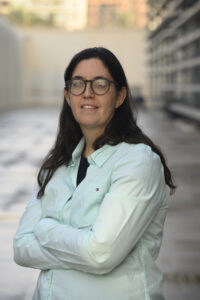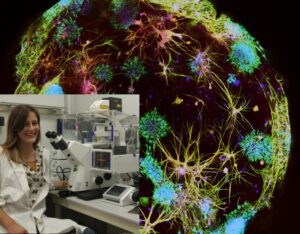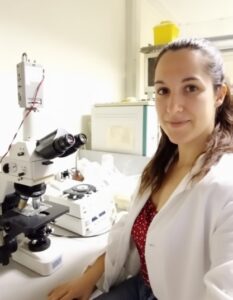Postdoctoral Researchers
Maria Medel Gonzalez

Email: mmedel@cipf.es
Maria Medel Gonzalez completed her PhD at the Universidad Autónoma de Madrid, where she focused on molecular materials, including synthesising and characterising ruthenium complexes, porphyrins, and phthalocyanines. She also collaborated with the University of Crete on peptide-coupled phthalocyanines, studying their properties and self-assembly behaviour. Subsequently, she worked on a Bill and Melinda Gates Foundation-funded proteomics project at GSK, identifying protein targets for tuberculosis and malaria using advanced structural techniques. Later, she contributed to the European CosmoPHOS-nano project, developing nanotechnology-enabled systems for imaging and treating atherosclerotic heart disease. She currently forms part of the Polymer Therapeutics Lab at the Principe Felipe Research Center, focusing on gene delivery vectors to treat diseases.
Carol Ganivet

Position: Postdoctoral Researcher
Email: cganivet@cipf.es
Carol Ganivet (ORCID: 0000-0002-4738-6460) obtained her B. Sc. degree in Chemistry at the Universidad Autónoma de Madrid, where she subsequently earned her Master’s degree in Organic Chemistry. Then, she received her PhD at the same university (2015) under the supervision of Prof. Tomás Torres and Dr Gema de la Torre, where she worked on novel single-molecule magnets and photosensitizers for molecular photovoltaics based on customized phthalocyanines. She moved to Texas (USA) as a postdoctoral fellow under the supervision of Prof. Luis Echegoyen, exploring new materials for their application in perovskite solar cells. After 2 years abroad, in 2018, she joined Dr Carlos Martí-Gastaldo at Instituto de Ciencia Molecular, where she stayed until 2022, working as a postdoctoral fellow for an ERC Starting grant project based on the synthesis of small molecules for the development of new metal-organic frameworks. That same year, she moved to Castellón to Prof. Eduardo Peris’ laboratory at Universidad Jaume I. Currently, she is working at the Laboratory of Polymer Therapeutics. She specializes in designing and developing new biomaterials, combining her extensive experience in multi-step total synthesis and knowledge of Schlenk line techniques.
Inés Sáenz De Santa Maria Fernández
Position: Postdoctoral Researcher
Email: isaenzdesantamaria@cipf.es
Inés obtained her Ph.D. in Cancer Research from the University of Oviedo in 2017, where her thesis focused on collective cell migration and invasion in head and neck squamous cell carcinomas (HNSCC). She published four papers as the first author and collaborated on 13 more, in addition to developing a patent for fluorescent probes to monitor mitochondrial function in living cells. Furthermore, she participated in organizing the 3rd Scientific Meeting of HypoxiaNet and won the Best Oral Presentation Award at the 1st INNOVA Scientific Meeting for Young Researchers in Salamanca, Spain, in 2018.
Afterward, she completed a postdoctoral fellowship at the Institut Pasteur in Paris (2019-2024), where she researched tunneling nanotubes (TNTs), a type of intercellular communication that facilitates the exchange of organelles, including mitochondria, between cells, and their role in glioblastoma (GBM) progression. She published several papers on TNT identification and glioblastoma stem cell resistance. She also studied mitochondrial exchange between tumor cells and astrocytes using a complex 3D organoid model, earning the Best Image of 2023 Award from the Société de Biologie Cellulaire de France. During her stay, she also served as a Guest Researcher at the NIH in the U.S., where she applied Intravital Subcellular Microscopy (ISMic) to study mitochondrial exchange in vivo.
Following this, she moved to IBBTEC, Spain, to the Tumor Microenvironment Lab, where she applied a vascular-organ-on-chip model to decipher the crosstalk between Cancer-associated Fibroblasts and Endothelial cells in colon cancer tumor progression.
Recently, Inés began a position as a Marie Sklodowska-Curie Postdoctoral Fellow in the ARISTOS program, a highly competitive fellowship, at the Centro de Investigación Príncipe Felipe (CIPF). Her research focuses on utilizing nanomedicine to block mitochondrial transfer via TNTs between tumor cells and the tumor microenvironment, thereby slowing breast cancer progression.
Maria Herrero Herrero
Position: Postdoctoral Researcher
Email: mherrero@cipf.es
Maria Herrero finalized her studies in chemical engineering at the Polytechnic University of Valencia in 2016, where she specialized in materials. She was then granted an FPI-MINECO fellowship to conduct her Ph.D. in technologies for health and wellness under the supervision of Dr. Ana Vallés, Dr. José Antonio Gómez, and Dr. José Carlos Rodríguez at the Centre for Biomaterials and Tissue Engineering (CBIT-UPV). Her thesis focused on the development of a 3D biomaterial that mimicked the filtration membrane of the kidney as an in vitro model to test drugs. She obtained her Ph.D. in 2022, with a cum laude mention; in addition, she also obtained her Master’s degree in secondary education teaching in the same year.
She next moved to Cergy (Paris) as a Marie Sklodowska-Curie Postdoctoral Fellow in the EUTOPIA program. She was under the supervision of Prof. Emmanuel Pauthe and Dr. Violeta Rodríguez at the Équipe de Recherche sur les Relations Matrice Extracellulaires-Cellules (ERRMECe), where she developed a multiscale platform to treat skin cancer. The platform combined gold nanoparticles for photothermal therapy and nanostructured lipid carriers loaded with curcumin for wound healing.
Her research was carried out in collaboration with the Integrative Biomedical Materials and Nanomedicine Lab (Barcelona), led by Dr. Pilar Rivera. During her stay in Barcelona, she obtained financial support from Agència de Gestió d’Ajuts Universitaris i de Recerca (AGAUR) to conduct a research project in which additional biomaterials were explored for wound healing (Maria Herrero and Marta Palau as co-principal investigators).
Maria has now started a postdoctoral position in the Polymer Therapeutics Laboratory as a Juan de la Cierva fellow, where she will focus on drug delivery. At the same time, she is studying for a B.Sc. degree in Biochemistry and Biomedical Sciences to enhance her profile in the multidisciplinary field of biomedicine.


